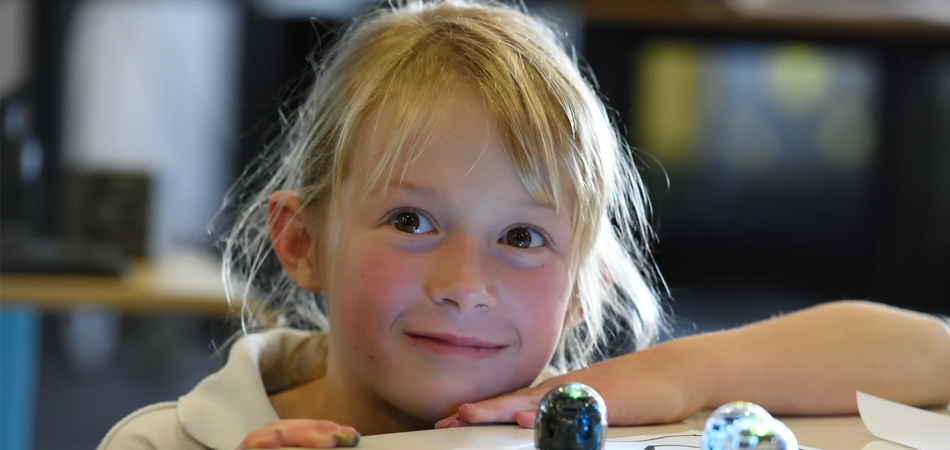As the schools get back to business, the news headlines focus on the months of learning that children have lost – and with good reason. Many pupils not only missed out on classroom teaching between March and July, they also didn’t have the opportunity to embed the previous term’s learning in their long-term memory.
When I ask my Sixth Form students what they want to study at university or what they want to be later in life, I am often in for a surprise. Their answers often include degrees or professions that I had not heard of and could not have imagined even ten years ago. At this point I would like to make it clear that I am not old (obviously!), but that the world has been and is changing at a breakneck pace and it is hard to keep up with it.
September is a golden month. The heydays of summer are over but there are still times when the afterglow of warmth burnishes our days before the early morning dews of autumn take over. In school there is still that freshness that goes with the beginning of a new school year. Classroom displays still look crisp and new, there is an eagerness to deliver new areas of learning which were planned over the summer and marking has not yet overwhelmed us.
Well, here we are again! The summer holidays are over, batteries have been recharged and, in my case, a new hip is in place. I love September, embarking on another exciting and, inevitably, action packed school year, and I’m looking forward to so many things.
It really goes without saying that the best part about returning to school is seeing the children again: their smiles and excitement, and that zest for learning. Then there’s the cohorts of 2, 3 and 4 year-olds brand new to our schools. These children are often nervous about coming to school for the first time but, with such skilled and caring staff, it doesn’t take long for them to shrug off their shyness, and, instead of hiding behind their parents, begin running across the playground to get into school. Already, after 1 week, our new children are settled and happy. In fact, at this time of year it is usually the parents of the children starting school for the first time who find it the most difficult. There are certain tools we use at both Copthorne and Holybrook that help make the transition easier for parents. Online assessment and reporting tools are so valuable in keeping parents involved in their child’s learning and celebrating the experiences they are having each day – as well as reassuring them that all is well. We use cloud based systems such as Early Essence and Tapestry, which allow us to share those ‘magic moments’ with parents by sending them regular photographs and updates about their child’s developmental steps.
As a school leader, parental engagement continues to be a real priority this year as - if we can secure this – we know that our teaching and children’s learning will be further enhanced whilst our children will feel supported, and what is happening at school will become part and parcel of daily conversations at home. At the end of last year at both schools, we launched the use of an APP-based parental engagement package: Marvellous Me, which I am so looking forward to seeing being fully implemented and embedded in our practice. To date, this is proving invaluable in providing a means of touching base with parents in an instant, sharing pupils’ learning, and, most importantly, sending positive messages and praise to parents about their children. This means that parents are collecting their children from school with smiles on their faces after having being sent a variety of ‘praise’ badges for their child and, often, a ‘super-parent’ badge for themselves. Children’s after-school experience now starts positively and the links between school and home are being effectively strengthened, with children seeing teachers and parents as partners in their education. Use of such systems has already reduced workload: sending praise is instant and no time is spent rooting in drawers, looking for stickers or praise postcards; newsletters can be very easily uploaded via the APP for parents – this is helping the environment and our budget, too – we are going to be using much less paper and our busy admin team are delighted about the reduction in photocopying.
It’s also always wonderful to see our staff team returning to school refreshed and so enthused about the year ahead.
Like most school leaders though, I continue to be most concerned about 3 areas: teacher workload; financial constraints; and ensuring that our curriculum is effectively planned and delivered whilst being meaningful and enjoyable for every learner.
I am, therefore, constantly seeking out new ways of addressing these two important areas. We have already embraced cloud based planning tools to reduce the amount of planning and enable teachers to share their planning across the school. This year we will be continuing to seek out cost effective and innovative solutions to support teachers with their workload whilst ensuring that the curriculum is inspiring, learning is effectively sequenced and the highest quality education is secured for our pupils. We’re particularly interested in new technologies which provide easy and quick access to high quality and inspiring resources such as video clips, sound bites and photographs, linked to specific subject areas and specific Key Stages in order to drastically cut down on the internet trawling which so many teachers seem to spend much of their lives doing in their quest for engaging resources.
The new Ed tech we have already purchased ready for this year is giving us a lot to feel positive about as teachers: our new class sets of Chrome Books and mini IPads are available for staff to use to enhance teaching and to support the children with the new ‘knowledge harvests’ which will take place at the end of each curriculum theme. Children will retrieve, organise and present their learning in innovative ways such as through the use of digital technology e.g. Using the IPads to create digital books; creating short films or vlogs using our green screen. This allows learning to be shared with a range of audiences whilst encouraging children to use and apply their computing and digital technology skills.
However, we know we need to continue our journey of improvement by seeking out innovative Ed Tech solutions to inspire and engage our pupils in relation to the STEAM subjects. This is an area upon which we really need to focus in preparing our children for the future and showing them what’s possible in the world of careers.
So, as usual, a busy year ahead but with wonderful learning opportunities to look forward to for our children and staff.
Chris Shepherd
Want to receive cutting-edge insights from leading educators each week? Sign up to our Community Update and be part of the action!
So… how does one shift students from continual summer mode to 21st-century learning mode? How does a school create problem solvers and students who embrace a challenge? Why does the old way of teaching need to be re-examined? How does a school reinvent its purpose? (Cacth part 1 here!)
The benefits of physical activity are well known to teachers. Being physically active can lead to improvements in the classroom, such as increased self-esteem and better concentration levels, which then contribute to greater academic achievement. Yet, even with so many positive benefits, it can be a big challenge for teachers to prioritise physical activity every day. I’ve seen first-hand the benefits for my pupils, so I’ve made getting active at St. John’s CE Primary School a priority for the whole school.
We all know that teacher and senior leader workload reduction is top of the national agenda, but the real challenge is how to achieve this. One man who’s decided to face the issue head-on is Simon Hickton, Managing Director of Cornerstones – a primary curriculum provider used by 2000+ schools in the UK and internationally. A self-professed ‘doer’, former headteacher Simon was keen to create an innovative, easy-to-use curriculum tool that could help leaders and teachers design and implement a whole-school curriculum at the click of a few buttons.

A community-driven platform for showcasing the latest innovations and voices in schools
Pioneer House
North Road
Ellesmere Port
CH65 1AD
United Kingdom